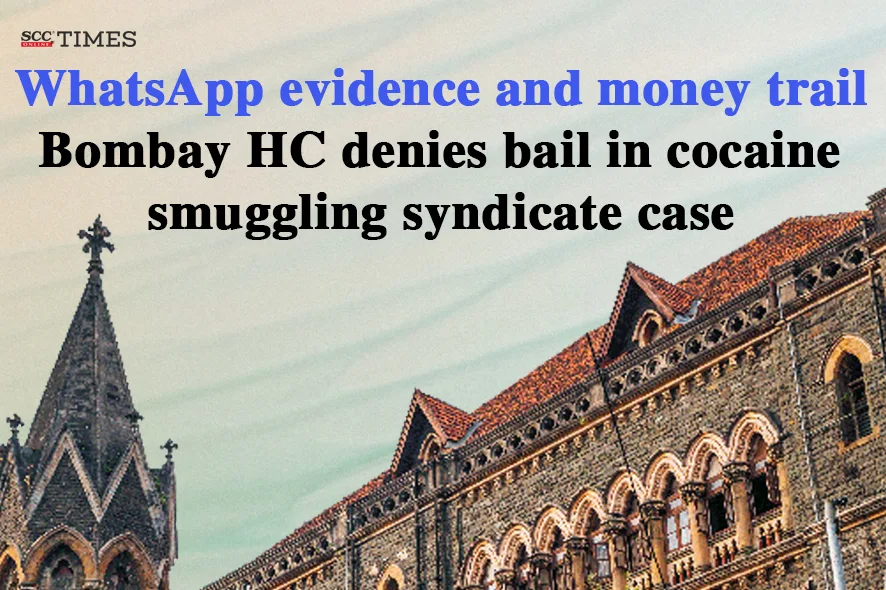Bombay High Court: In the present application, the applicant sought bail in a case registered alleging offences under Sections 21(c), 23(c), 27(A), 28, 29, 30, 35, and 54, read with Section 8(c) of the Narcotic Drugs and Psychotropic Substances Act, 1985 (‘NDPS Act’). He claimed that the implication was based solely on statements made by the co-accused and his wife, with no recovery of contraband or money trail. A Single Judge Bench of Dr. Neela Gokhale, J., while dismissing the bail application, held that even without relying on the statements made by the co-accused under Section 67 of the NDPS Act, the circumstantial evidence dissuaded the Court from granting bail. The Court held that there were no reasonable grounds to believe that the applicant had not committed the offence.
Background:
On 03-04-2023, based on specific intelligence, authorities intercepted a man (hereinafter referred to as “the accused”) at Chhatrapati Shivaji Maharaj International (‘CSMI’) Airport, Mumbai, arriving from Ethiopia. A search of his luggage led to the recovery of 1970 grams of cocaine, which was nearly 20 times the prescribed commercial quantity. The accused gave a statement under Section 67 of the NDPS Act, in which he implicated the present applicant.
The accused had previously worked as a cab driver in a travel agency owned by the applicant’s uncle. He alleged that the applicant recruited him into a drug trafficking network and managed all logistics, including flight bookings, hotel arrangements, and coordination for collecting the contraband. Based on this information, the applicant was apprehended on 04-04-2023 from a hotel near the airport.
Upon arrest, the applicant allegedly confessed and implicated an African national as the key figure directing the operation. He claimed to be working under the instructions of this individual and communicated with him via WhatsApp calls and chats. Although some chats were deleted, forensic recovery revealed messages related to drug logistics and financial transactions.
The applicant’s wife also gave a statement confirming that the accused acted on her husband’s instructions. She admitted that her phone and bank account were used by the applicant to receive funds from the African national, which were later withdrawn to cover operational expenses. Bank records showed significant deposits from the African national into her account.
The prosecution presented WhatsApp transcripts, call logs (117 calls between the applicant and the accused), and bank statements as evidence. These materials, along with forensic reports and co-accused statements, were used to charge-sheet the applicant under multiple sections of the NDPS Act.
The applicant had filed a bail application before the NDPS Special Judge, which was rejected by order dated 07-05-2024. Consequently, the present application was filed seeking relief. It was alleged that the implication was based solely on statements given by the accused and the applicant’s wife. The accused’s statement, being one given to the police, was argued to be inadmissible in evidence. It was further contended that no contraband was recovered from the applicant, and there was no money trail showing deposits in his bank account. The applicant was arrested on 05-04-2023, and charges had not been framed till date. Therefore, he sought bail on the ground of prolonged incarceration.
Analysis and Decision:
The Court observed that Section 37 of the NDPS Act placed strict conditions on the grant of bail. The Court further emphasised that the Public Prosecutor had to be given an opportunity to oppose the bail, and if opposed, the Court had to be satisfied that there were reasonable grounds to believe the accused was not guilty and was unlikely to commit any offence while on bail.
The Court reiterated that the Apex Court, in a series of decisions, had clarified the meaning of the expression “reasonable grounds,” stating that it referred to credible and plausible grounds capable of persuading the Court that the accused had not committed the offence. The Court noted that, at the stage of considering bail, it was not necessary to weigh the evidence or record findings of guilt, and that only the existence of such grounds was required.
The Court noted that statements recorded under Section 67 of the NDPS Act could not be relied upon to establish guilt and had to be kept aside. However, the Court highlighted that these were not the only materials on record, since the WhatsApp chats recovered by the Cyber Forensic Laboratory from the mobile phones used by the applicant revealed his involvement in the smuggling syndicate of the contraband substance.
The Court emphasised that there had been over 117 calls between the applicant and the accused, as well as other unknown persons including the African national. Further, the chats and voice notes pertained to planning operations, booking logistics, coaching others on handling enforcement queries, and identifying delivery locations. The Court also noted the seizure of 1970 grams of cocaine from the accused, and the bank records showing large deposits from the African national into the account used by the applicant, which were subsequently withdrawn to fund the operation.
The Court concluded that, even without relying on the statements made by the co-accused under Section 67 of the NDPS Act, the circumstantial evidence dissuaded it from granting bail. The Court held that there were no reasonable grounds to believe the applicant had not committed the offence. The Court further observed that the length of incarceration, approximately two years, was not sufficient to override the statutory restrictions under Section 37.
Accordingly, the bail application was rejected. The Court clarified that the observations were prima facie and that the Trial Court would decide the case independently on its own merits.
[Syed Sameer Hussain v. State of Maharashtra, 2025 SCC OnLine Bom 3360, decided on 25-09-2025]
Advocates who appeared in this case:
For the Applicant: Hrishikesh Mundargi i/b Pravada Raut
For the Respondent: Manisha R. Tidke, APP, Saket R. Ketkar, SPP


